

Not many would have heard of Inder Mohan Lall. Or his story of becoming, in 1948, the first subject to have won a case against the British Empire. Having been dismissed from his post in the Indian Civil Service (ICS) by the British administration, on colonial bias, and without following due process of the law, Lall, who had been a judge himself, fought a long and determined legal battle for justice. This ultimately took him to the Privy Council, the highest court of appeal for the entire commonwealth at the time, which passed a landmark verdict, reversing his dismissal and reinstating him to the service.
‘High Commissioner for India and the High Commissioner for Pakistan vs I M Lall’ is the case that formed the foundation of Article 311 of the Constitution of India, “stipulating due process to be followed before any civil service officer is removed or reduced in rank”. It is the history of this case and the man who fought it that is the subject of 'At the Pleasure of His Majesty- IM Lall, and the 'Case that Shook the Crown' (Rupa), written by Chander M Lall, grandson of Lall, and a senior advocate practising law at the Supreme Court of India and the Delhi High Court.
Why Lall irked the British
Lall is an unsung hero, says Chander. Growing up, he used to hear stories about the achievements of his grandfather, who had passed when he was very young. But it is only after he became a lawyer himself that he came to see the greater significance of them. “When I joined the legal profession, I met many lawyers who identified me by my surname. They would ask if I am the grandson of the great IM Lall. When I said yes, I would be informed that he was involved in a famous case which he won in the Privy Council and which forms the base case for service law. I eventually read the case and decided that this is a story that must be told,” says Chander.
The book, which, according to Chander, tells a “true story which has all the twists and turns of a film”, chronicles Lall’s humble beginnings in Mianwali, a small town in Lahore, now in Pakistan, his education in law, service in the British Indian army during the First World War, which took him to Mesopotamia, and his entry into the ICS.
It goes on to describe how Lall attracted the ire of the Empire, while posted at the North-West Frontier Province, with his open support for the Roerich Pact, which sought to protect the cultural property of India, specifically the preservation of the ruins of the Buddhist monastic complex in Takht-i-Bahi, now in Pakistan, and the Gandhara statues, which the British considered as private property and were planning to move to England. This eventually manifested in his suspension from service as the district and sessions judge, as he had become “a thorn in the
Empire’s side”. With Lall’s case as the pivot of the narrative, detailed with the help of significant letters and documents, Chander weaves a story that is at once family history and that of perhaps the most significant period in the history of the country—the period of India gaining independence from the British and the bloodshed of the Partition that followed.
Tumultuous times
The chapter titled ‘Tears of Blood: Partition’ portrays the tumultuous period, through the story of Amar Raj Lall, Chander’s father, who was entrusted with taking care of the family while Lall was fighting the case in Britain. “Those were uncertain times and even just prior to Partition people did not know which side of the border Lahore would fall on. With my grandfather in London the entire burden of the security of the family fell on the young shoulders of my father. He was young and somewhat temerarious. Not only did he move the family to safety in Amritsar almost single-handedly, but returned several times, risking his life each time, to bring back household material,” says Chander.
Questioning His Majesty
The most important aspect of his grandfather’s story, for Chander, is its significance in the context of the freedom struggle. “The dismissal of my grandfather from the ICS was without following due process of the law, which, he argued at the Privy Council, was his inherent right. The Crown
responded by saying that ICS officers are hired at the pleasure of His Majesty the King and can be fired at his pleasure. More so because he, as an Indian, was also the subject of the Empire. But the court ruled in his favour. The case shook the very foundation
of British beliefs and the powers of His Majesty the King of the commonwealth,” says Chander.
A lesson in standing tall
Chander believes that Lall has a lot in common with figures like Gandhi and Nehru. All of them were lawyers by profession and were considered “troublemakers” by the British. And all of them refused to be cowed down by the Empire. “A lesson one can take from IM Lall’s struggle is that one should never bend before powerful authorities, and one should always stand tall and do what one believes is right,” states Chander.